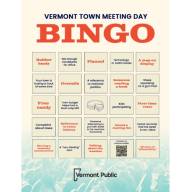Friends of the Mad River (FMR), in partnership with the towns of Warren and Fayston and a handful of landowners, has completed final engineering designs for five stormwater treatment projects that will reduce road maintenance costs, increase The Valley’s flood resilience, improve trout habitat and contribute to a cleaner Mad River and Lake Champlain.
In May of 2019, the five Mad River Valley towns wrapped up a two-year planning process in which they prioritized opportunities for better stormwater management across the watershed. The five projects FMR engineered this year were among the top priorities from that process for the towns, the state and the river.
In Warren, on Vaughn Brown and Pit Roads, and in Fayston on Mansfield, Center Fayston and Murphy Roads, the five sites present erosion and runoff issues that are persistent problems for road crews and dramatic problems for water quality. A combination of “plunge pools,” new culverts, catch basins and realigned ditches add up to stormwater solutions that, when constructed, will slow water down and give it a chance to sink into the ground, ultimately filtering out harmful pollutants and reducing flood vulnerabilities.
The final design work was completed earlier this month by Watershed Consulting Associates (WCA) and was funded by the Vermont Department of Environmental Conservation's Clean Water Initiative Program. Friends of the Mad River worked with towns to get over 95% of the costs supported in grant dollars with the remaining amount of matching support from FMR and the towns.
Many stakeholders were a part of the projects’ success. Fayston and Warren office and road crew staff and select boards provided input at various stages in the process while landowners offered input to the designs and have been generous in their openness to allowing portions of their land to be used for the public good.
“Investments in infrastructure and the power of nature to support it – instead of fight against it – result in a “win” for town budgets, community resilience and clean swim holes,” said Corrie Miller, FMR director. “And, the willingness of landowners to engage in this process to support all these benefits was inspiring.”













